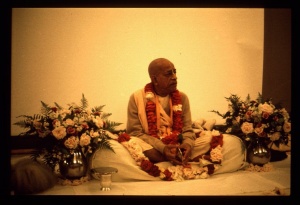SB 1.6.29: Difference between revisions
m (1 revision(s)) |
No edit summary |
||
| Line 1: | Line 1: | ||
{{info | {{info | ||
|speaker= | |speaker=Nārada Muni | ||
|listener= | |listener=Śrīla Vyāsadeva | ||
}} | }} | ||
[[Category:Srimad-Bhagavatam - Canto 01 Chapter 06]] | |||
[[Category:Bhagavatam Verses Spoken by Narada Muni - Vanisource|010629]] | |||
<div style="float:left">'''[[Srimad-Bhagavatam]] - [[SB 1|First Canto]] - [[SB 1.6: Conversation Between Narada and Vyasadeva|Chapter 6: Conversation Between Nārada and Vyāsadeva]]'''</div> | |||
<div style="float:right">[[File:Go-previous.png|link=SB 1.6.28]] '''[[SB 1.6.28]] - [[SB 1.6.30]]''' [[File:Go-next.png|link=SB 1.6.30]]</div> | |||
{{CompareVersions|SB|1.6.29|SB 1962|SB 1972-77}} | |||
{{RandomImage}} | |||
==== TEXT 29 ==== | ==== TEXT 29 ==== | ||
<div | <div class="verse"> | ||
kalpānta idam ādāya | :kalpānta idam ādāya | ||
śayāne 'mbhasy udanvataḥ | :śayāne 'mbhasy udanvataḥ | ||
śiśayiṣor anuprāṇaṁ | :śiśayiṣor anuprāṇaṁ | ||
viviśe 'ntar ahaṁ vibhoḥ | :viviśe 'ntar ahaṁ vibhoḥ | ||
</div> | </div> | ||
| Line 17: | Line 23: | ||
==== SYNONYMS ==== | ==== SYNONYMS ==== | ||
<div | <div class="synonyms"> | ||
kalpa- | ''kalpa-ante''—at the end of Brahmā's day; ''idam''—this; ''ādāya''—taking together; ''śayāne''—having gone to lie down; ''ambhasi''—in the causal water; ''udanvataḥ''—devastation; ''śiśayiṣoḥ''—lying of the Personality of Godhead (Nārāyaṇa); ''anuprāṇam''—breathing; ''viviśe''—entered into; ''antaḥ''—within; ''aham''—I; ''vibhoḥ''—of Lord Brahmā. | ||
</div> | </div> | ||
| Line 24: | Line 30: | ||
==== TRANSLATION ==== | ==== TRANSLATION ==== | ||
<div | <div class="translation"> | ||
At the end of the millennium, when the Personality of Godhead Lord Nārāyaṇa lay down within the water of devastation, Brahmā began to enter into Him along with all creative elements, and I also entered through His breathing. | At the end of the millennium, when the Personality of Godhead Lord Nārāyaṇa lay down within the water of devastation, Brahmā began to enter into Him along with all creative elements, and I also entered through His breathing. | ||
</div> | </div> | ||
| Line 31: | Line 37: | ||
==== PURPORT ==== | ==== PURPORT ==== | ||
<div | <div class="purport"> | ||
Nārada is known as the son of Brahmā, as Lord Kṛṣṇa is known as the son of Vasudeva. The Personality of Godhead and His liberated devotees like Nārada appear in the material world by the same process. As it is said in the Bhagavad-gītā, the birth and activities of the Lord are all transcendental. Therefore, according to authorized opinion, the birth of Nārada as the son of Brahmā is also a transcendental pastime. His appearance and disappearance are practically on the same level as that of the Lord. The Lord and His devotees are therefore simultaneously one and different as spiritual entities. They belong to the same category of transcendence. | Nārada is known as the son of Brahmā, as Lord Kṛṣṇa is known as the son of Vasudeva. The Personality of Godhead and His liberated devotees like Nārada appear in the material world by the same process. As it is said in the [[Bhagavad-gita As It Is (1972)|''Bhagavad-gītā'']], the birth and activities of the Lord are all transcendental. Therefore, according to authorized opinion, the birth of Nārada as the son of Brahmā is also a transcendental pastime. His appearance and disappearance are practically on the same level as that of the Lord. The Lord and His devotees are therefore simultaneously one and different as spiritual entities. They belong to the same category of transcendence. | ||
</div> | </div> | ||
__NOTOC__ | |||
<div style="float:right; clear:both;">[[File:Go-previous.png|link=SB 1.6.28]] '''[[SB 1.6.28]] - [[SB 1.6.30]]''' [[File:Go-next.png|link=SB 1.6.30]]</div> | |||
__NOTOC__ | |||
__NOEDITSECTION__ | |||
Revision as of 08:35, 30 April 2021

A.C. Bhaktivedanta Swami Prabhupada
TEXT 29
- kalpānta idam ādāya
- śayāne 'mbhasy udanvataḥ
- śiśayiṣor anuprāṇaṁ
- viviśe 'ntar ahaṁ vibhoḥ
SYNONYMS
kalpa-ante—at the end of Brahmā's day; idam—this; ādāya—taking together; śayāne—having gone to lie down; ambhasi—in the causal water; udanvataḥ—devastation; śiśayiṣoḥ—lying of the Personality of Godhead (Nārāyaṇa); anuprāṇam—breathing; viviśe—entered into; antaḥ—within; aham—I; vibhoḥ—of Lord Brahmā.
TRANSLATION
At the end of the millennium, when the Personality of Godhead Lord Nārāyaṇa lay down within the water of devastation, Brahmā began to enter into Him along with all creative elements, and I also entered through His breathing.
PURPORT
Nārada is known as the son of Brahmā, as Lord Kṛṣṇa is known as the son of Vasudeva. The Personality of Godhead and His liberated devotees like Nārada appear in the material world by the same process. As it is said in the Bhagavad-gītā, the birth and activities of the Lord are all transcendental. Therefore, according to authorized opinion, the birth of Nārada as the son of Brahmā is also a transcendental pastime. His appearance and disappearance are practically on the same level as that of the Lord. The Lord and His devotees are therefore simultaneously one and different as spiritual entities. They belong to the same category of transcendence.